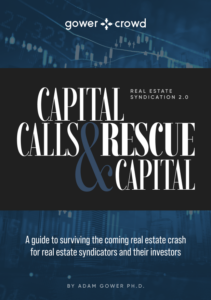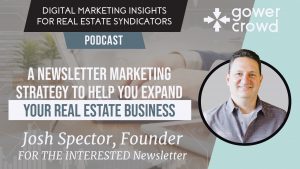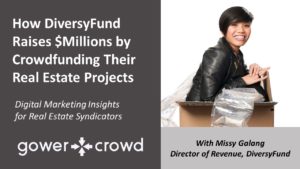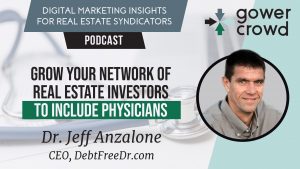Podcast Episode 310: Jon Carden,
Fundrise Syndication Basics Done Well

To quote them in their own words, "armed with a revolutionary business model, disruptive technology, and world-class real estate, Fundrise is on a mission to deliver the best investing experience ever."
And spearheading their digital marketing efforts, bringing with him a pedigreed marketing background including some peer-leading time at Uber, Jon Carden is one of the masters of the field.
As Jon says, although the basics of digital marketing for real estate sponsors are easy to summarize, they are difficult to implement well.
Find out in this episode how Fundrise excels in delivering the highest caliber digital and social media marketing in the industry today, and see below for more links to Jon and Fundrise.
What You're Going to Learn
* How investors assess you
* The 1 key thing to do to reach your prospects
* How to refine your messaging
* What using a funnel means to communicate
* Why you must be consistent - and how
* How to balance personality and professionalism online
And much, much more.
Listen To or Watch the Full Podcast Here
Show Highlights
Using a Funnel to Communicate
Adam Gower: You've alluded to something- you talked about the journey. The journey implies a series of contact points, both outside of the Fundrise ecosystem, as well as inside. This was something we chatted about before we started. Tell me more about this concept, in the context of what is a funnel?
Jon Carden: Yeah, absolutely. The funnel, broadly speaking, is ... The top of the funnel is people who've never ever heard of Fundrise. That's the broadest possible group. Of course, my job is to make that amount smaller, and smaller over time. Right now, there's still a ton of people who've never heard of us.
Then you have people who have heard of us. They don't really know what we're doing. Then you have people who now are starting to consider us. Then, of course, we take you all the way down until you're an investor, and hopefully you're an advocate for us, and you're really an ambassador for Fundrise out there.
Of course, now, knowing what that funnel is, the question is where do we connect with you? Maybe even more importantly, where are you getting your information at each stage in the funnel?
For instance, you may have heard of us because you read an article on a personal-finance website that talked about how to invest. You've got a huge tax refund, and here's one way to invest that money. That's one place where a lot of people are finding information about where to invest next, even high-net-worth individuals.
Obviously, we'd love to have a presence there. We use display advertising, also, with really, really smart targeting, to be efficient, to reach people who've probably never heard of us.
Our hope is, now you've heard of us; now you want to google us. Then, it's about the effort of ... When somebody googles your brand, what do they find? That's something that you should invest a lot of time in is making sure that they find something that's going to be more persuasive than not.
Then you come to our site for the first time; maybe this is six months later. We see this all the time. Now, it's like what are you finding based on the level of information you have? What are you finding on Fundrise.com, or whatever landing page you came to?
Then you give us your email address, and now it's what information are we giving you now? We kind of know what you know, at this point, so what are maybe the gaps between you not investing, and you investing that we can help close for you?
We try to be very intentional. Of course, we test everything all the time, but we try to be very intentional about making that funnel feel as natural as possible, so that you just feel really confident in the buying decision, with the investing decision you're about to make.
Why You Must Be Consistent, and How
Adam Gower: One thing that I've noticed is prominent in Fundrise's ecosystem is that absolutely everything I see, from social media, to advertising, it always looks exactly like Fundrise. Tell me a little about consistency, and how you manage that process, especially when you have all these different nuances on the different social-media sites.
Jon Carden: Totally. That's a huge part of my job. We have an amazing team who are all running at full speed, in not different directions, but parallel directions. A big part of my job is to try to make sure that all stays headed towards the same goal, and that we're telling the same story, even if we're modulating, or telling a different aspect.
Consistency just cannot be more important, especially today, because getting attention is ... I think attention is one of most valuable commodities that's out there right now. Every brand thinks that people are thinking about them more than they actually are.
We feel like we are actually going to need to get in front of you 10, 11, 12 times before you'll even really consider investing. For a lot of people, if you're inconsistent with your branding, and your message, they won't even realize that they've come across your stuff 10, 11, 12 times.
If you want to break through the noise today, I think consistency is as important as it's ever been. If you're going to value one thing, I would say make sure people know when they've come across you, what you sound like, and what you look, because you're just not going to get that many chances to get someone's attention. That's unbelievably critical; cannot emphasize that enough.
Adam Gower: It's really important, isn't it? There's actually two forms of consistency. One is in the way that you look, and also messaging. How do you hone your message, because you also have this ... Gosh, I say this with the greatest respect-
Jon Carden: I can't wait [cross talk]
Adam Gower: -a really simple message that you deliver. There's no complexity. When you unravel it, anybody can understand it, from the least knowledgeable of real-estate investing, to the most sophisticated. How do you drill down on doing that? It's not an easy thing to do.
Jon Carden: No, it's not, and it's something that we're always trying to get better at. When I was first hired, we did an exercise internally, where I asked people - everyone individually, even on our senior leadership team - what is Fundrise? I actually got a lot of different answers, because our model had changed many times over the years.
That was something ... We had to start with internal, and getting everyone on the same page with what exactly do we do. That sounds so simplistic, but I think really every brand should probably do that every once in a while. Come up with that positioning statement of: who are we? Who are we for? How do we want to be perceived by our audience?
Then, whenever it comes to actually sharing that message, there's this age-old debate in marketing of features versus benefits. I think we try to really emphasize, now, benefits, because benefits are easy to understand. A benefit is- a feature is something like, "We use all this technology to create this diversification with your portfolio." A benefit is not having to be afraid of a market downturn. It's feeling confident in your portfolio, because you have asset-class diversification that you couldn't have had before.
For us, it's continually challenging ourselves, trimming the fat, and really drilling down on what are the benefits that we're offering to our investors? Not so much all the cool ways that we're creating those benefits, because that's just not really that impactful.
I think that's where a lot of brands, especially in our space, get lost. They know they're doing really cool things that have maybe even never been done before, but it doesn't actually matter to the investor. The investor just wants an amazing portfolio. That's what we try to just constantly harp on, internally, and get better at every day.
How to Balance Personality with Professionalism Online
Adam Gower: ... also mentioned the idea of feeling safe during a downturn. That's very interesting, because that's topical. Actually that leads in to this question-
Jon Carden: Sure.
Adam Gower: The only place that I have actually heard that discussed in the Fundrise ecosystem is actually a really well-written, interesting article that Ben wrote about exactly that-
Jon Carden: Yeah, sure, about the downturn.
Adam Gower: About the downturn. I think he said, "I wake up every night thinking about it," or, "There's not a day goes by that ..." [cross talk]
Jon Carden: That's true, yeah.
Adam Gower: It was a very interesting article. Here's my question about that: one of the things that I've understood, or come to understand about social media is that it is "social." It is about personalities; it's about the the soul of the company, the people of the company, et cetera.
When I see Fundrise online, I really do see a corporation, a lot more than I see personalities. Can you talk about this kind of bifurcation of personality, and how you manage that balance with the kind of corporate feel?
Jon Carden: Absolutely. I think it's a really interesting challenge. I think brands, more and more, are trying to personalize who they are to their investor. We are a little skeptical of the efficacy of that, at times.
It's not that you shouldn't stand for anything. It's not that you shouldn't have any personality, but, again, I think that brands tend to assume that people are very, very interested in who you are, and what your dog looks like. We're very proud of our dogs, Adam-
Adam Gower: You do! You've got a mascot, don't you?
Jon Carden: Yeah, we've got a mascot, and he's great, but we're a little skeptical that that actually is the most important thing. Maybe, at some point, it does become very, very important. Like Uber obviously had some massive personality issues, and that was really derived from the founder at the time. It certainly can become an issue.
For us, we feel like we're asking you to trust us. We're asking you to entrust us with either thousands of dollars, or millions of dollars. Either way, it's a substantial amount for you, so we want to make sure that, first and foremost, we're explaining exactly why we should be trusted. That comes down to the product, itself.
The people behind the product are, of course, extremely committed to doing a great job on behalf of our investors. We're extremely customer-obsessed, but we don't feel like, right now, the most important thing is to make sure that they know what Ben looks like, even.
Ben doesn't really have the ego to make that his top priority, and frankly, our investors are not begging for it either. We don't see that; like, "Oh, if only we knew what Jon looked like ..." That just doesn't seem to be a huge priority for our investors.
At this point, we tend to use social media in a way that we think adds the most value, actually, for the investors, rather than for ourselves. That tends to be a little bit more informational; maybe sometimes aspirational ...
We don't take a really personal approach. because we're a brand, and we're not gonna pretend to not be a brand. We are a brand ... That's a little bit counter-cultural maybe, even, for the social-guru mentality of the day, but it's been very effective for us.
This is How Investors Assess YOU
Adam Gower: Explain to me how you learned what Fundrise was, in the context of our conversation today. What [cross talk]
Jon Carden: Absolutely, and I think this really helps even inform our funnels, which we'll talk more about in a second ... What I did is I think what a lot of people do. I immediately just went on the search, and the hunt for everything I could find online.
I had a couple of friends, who I knew who had invested with Fundrise, that I reached out to, and said, "Hey, what is this thing?" Then I just read everything I could, from classic journalism pieces - whether it was CNBC, or Yahoo Finance, or whatever - to Reddit, and forums, to reviews by sites, like Investor Junkie, and Financial Samurai, that sort of thing.
I just read as much as I could, and then went to Fundrise.com. All of that pretty much before ever going to Fundrise.com, which I think is maybe a big secret tip for everyone out there. It's what people are saying about you that often matters a lot more than what you're saying about yourself.
Adam Gower: Right. That is interesting, isn't it? The primary source of information for you was not necessarily the Fundrise site, it was everything in the ecosystem that is online that they've put out, or that people have written about them.
Jon Carden: Exactly. Yeah, I think going to Fundrise.com, and then seeing how they described themselves; at that point, I was personally more or less assessing their ability to tell their own story, and less looking for actual substantive information.
I figure if other people aren't already talking about you, and don't already know your story, then there's probably something wrong. I spent most of my time, sort of like, I think, buying a car now, where most of the time is spent not at the dealership; it's spent outside the dealership, and you only go there to buy.
Adam Gower: Jon, do you think that's how people actually do research these days? Is that how people understand opportunities, do you think?
Jon Carden: Absolutely. I think any industry, whether it's retail, or buying a car, like I just mentioned, or buying a house, the vast majority of the consumer's time is spent off-property. They're doing their own research. That's why influencers have been such a major, major force in retail, especially these days, is people know what they want to buy before they ever get to the store.
We live in this research economy now, where information is everywhere, so I think that it's a really, really critical thing for people to understand, because if it's just on your property, it doesn't have the same weight as someone saying something about you.
Do This 1 Thing to Reach Your Prospects
Adam Gower: ... for somebody that maybe doesn't have that infrastructure in place, first. Where would you start the process, do you think?
Jon Carden: I think a self-assessment's pretty critical. Even if you've done no proactive work to this point, really try to put yourselves empathetically in the shoes of your potential customer, or partner, whoever it is, and say, "What could they find out about me now?" What is the narrative now, if anything?
Then, if there's nothing about you right now, you would want to say, "Well, where might they go, thinking they would find something about me? What are the sources of truth that are really popular for my audience in particular?"
For different industries, that may be different things, but for us, a lot of times that's these massive personal-finance blogs; it's social media, of course. It's forums; Reddit is an incredibly powerful community now.
Starting to find, and really create a checklist, and then, I think, prioritizing which ones can you actually influence, or begin to build a presence on is huge. Again, that's going to depend on who your target is. You just have to know where are your customers- where's your target audience living, and breathing, day to day, and you've got to reach them there.
Picking one place, whether it's social media for some brands; whether it's really small niche groups, if you're going after a very specific niche, and you want to find that one forum that people tend to congregate around ... Finding those things, and then developing some sort of strategy for reaching that audience.
Adam Gower: Let's talk about that strategy. Now, let's say we identify ... Just for argument's sake, we identify a couple of low-hanging fruit - LinkedIn, and Twitter - whatever it happens to be. It's maybe where we think we can find high-net-worth individuals who might be interested in investing with us. We identify that; maybe Reddit, or somewhere else. What's the next step? We've ID-ed the real estate, the digital real estate. Now what?
Jon Carden: There's two sort of broad trains of thought that you can take here. One is what we'll call organic, where you're attempting to maybe create content that creates a lot of value for the audience that you're attempting to reach; and so you're hoping that maybe that content can be aggregated by one of these sites where you've found people are living right now.
Maybe on LinkedIn, there's a very specific group on LinkedIn, and you're creating content that adds value for that group, and trying to build sort of an organic reputation that way.
The other main train of thought is the paid route, where you're looking to actually partner with the groups themselves. A lot of these people who are attempting to build an audience, a big part of that is they know that, at some point, they'll be able to monetize having created this centralized location for people to meet, and talk about whatever their shared interest is. They know that brands will be very interested in being able to reach a high concentration of a single type of person.
If you can find one of these centralized groups, or sites, or platforms, and partner with them to put your information in front of their audience, that's another way to sort of test it out.
Refining Your Messaging
Adam Gower: How do you deliver content to people? How do you determine what stage they're at, and then develop, and deliver appropriate content to them?
Jon Carden: It depends on the channel, and how targeted we're able to be. With email, for instance, we can be extremely targeted. We know exactly who we're sending an email to, so we can get very, very, very niche, and say we're going to deliver ... This amount of information is the perfect amount of information for the right audience.
However, something like LinkedIn, or Facebook, where you have a broad audience, you're best off being sort of disciplined, and picking where you think the highest-impact, lowest-hanging fruit lie.
For us, for instance, we don't spend a lot of time educating people on why real-estate investing matters. That's something, of course, that's important, but we figure that if you're not really interested enough in personal finance to understand how investing works - then, even one step below that, why real estate could be interesting - we probably ... While we would love for those people to get education, it's just not the best use of our time right now.
Instead, we focus on an audience who already knows that real estate is attractive, but they just don't understand how it works online, or why Fundrise might be the best avenue for that sort of thing. We just try to be disciplined, and prioritize a very specific audience, and always write, or create content specifically for that person.
Adam Gower: How do you know what it is exactly to write about? Do you do focus groups, or is it ...? Tell me how you do that.
Jon Carden: Yeah, I think we move quickly, and iterate. That's a lesson learned from Uber, maybe, where we are extremely data-driven, so we know exactly how everything we do works, and have a really good understanding; very good leading indicators early on of whether or not we've guessed right.
My team, I sort of try to instill in them permission to fail. As long as we're not doing something that could in any way degrade the brand, if someone has a good idea for something that they think could add value for our audience, we say, "Hey, move as fast as you can. Execute at a high level, and then measure it really consistently. If it works, double down; if it doesn't work, cut it,and move on."
Adam Gower: When you say 'measure it,' you're actually able to see what people are consuming of what you put out there, aren't you?
Jon Carden: Absolutely, yeah, we measure ... We are as data-driven as any company that I've worked at. We've built a team that enables us to really understand the first-, second-, and third-degree effects of everything we do, especially that happens in the digital marketplace.
Adam Gower: That's fascinating. How do you do that, actually? What are the data flows that you can utilize?
Jon Carden: Some of it's tools. We work with companies, like Mixpanel, and, of course, Google Analytics, and some of these ... We also have a lot of in-house solutions for actually aggregating the data, and use things like Tableau to allow us to visualize the data.
The biggest key, as anyone who works in data would tell you, is it's not so much about getting the data. It's about actually acting on it. What we've done is we've just been able to work really hard to build an attribution system that allows us to know ...
For the vast majority of traffic that's coming to our website, the vast majority of sign-ups, and lead captures, and investors, we know exactly what their journey has been to this point. A lot of that's due to in-house solutions that our engineering team have built for us. Then, we also have just really strong analysts in-house, who are actually helping us make decisions based on what we're seeing in terms of just broad trends, because it's not really always about ...
There's a big debate in the digital world of first-click attribution, or last-click attribution, meaning it first site you ever went to that told you about Fundrise that's the most important part of your journey, or is it the last site that you went to, before deciding to invest that's the most important part? We try to take this holistic perspective to help us decide how to spend our money and spend our time.
Related to this episode:














